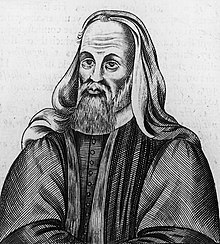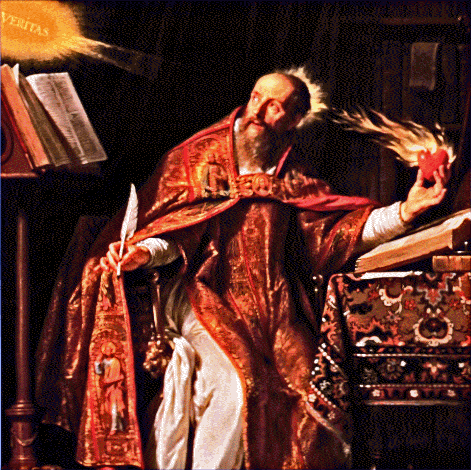We have heard much about him recently. Pelagius, we know, asserted that we could merit Heaven by our own efforts. His doctrine made Christ and His Sacrifice on the Cross unnecessary. Wikipedia tells us that...
'Pelagius (fl. c. 390-418) was an ascetic who opposed the idea of predestination and asserted a strong version of the doctrine of free will. He was accused by Augustine of Hippo and others of denying the need for divine aid in performing good works.His crimes are in light blue, bold. Because of Original Sin, Pelagius's doctrine is, of all the heresies to fall into, one of the easiest to fall into because while we are wounded creatures because of Original Sin, we desire to be good and to do good. As believers, we also desire Heaven and to keep God's commandments. So often, however, we want to be 'good without God' (since to seek separation from God is in fact our natural human state) - or imagine that we can be, which, ironically, is what some militant atheists maintain they either are or can be - 'good without God'. As others have commented, I find it hard to understand why the accusation of Pelagianism should fall particularly at the feet of 'certain traditional communities' within the Catholic Church but we should examine why it is so. These communities were not named, so it is difficult to assess which communities the Holy Father was thinking of when His Holiness said it. It certainly opens up an interesting discussion.
For him (according to them), the only grace necessary was the declaration of the law; humans were not wounded by Adam's sin and were perfectly able to fulfill the law apart from any divine aid. He denied the more specific doctrine of original sin as developed by Augustine. Pelagius was declared a heretic by the Council of Carthage. His interpretation of a doctrine of free will became known as Pelagianism.'
As far as I can see, Pelagianism, if you strip Pelagius of his asceticism, could equally be applied to the 'liberal Catholic' position, not, I hasten to add, that the Holy Father is that. If Pelagianism can be reduced to someone saying, 'I'm good without God', then the liberal Catholic falls surely into the same category because if Catholic teaching on sin and salvation is rejected, Christ's Sacrifice isn't required in that scenario either. These false ideas, His Holiness has criticised as well. Yet, Pelagianism is more than this since Pelagius was suggesting that through the human will we could merit worthiness of Heaven - a teaching that contradicts the Catholic doctrine that not only are we afflicted by the effects of Original Sin but that Heaven is always a gift from God above that is His alone to grant and of this great gift nobody, short of Our Lady and her Divine Son is worthy and even Our Lady won her unsurpassable merits from He who she bore.
Yet, clearly, the human will is important to God. The commandment to 'love the Lord thy God with all thy strength, all thy heart, mind, understanding' suggests that God is not indifferent to the human will, since the will is involved in both worship and the love of God. The exercise of the human will is also involved, of course, in loving our neighbour. Christ Himself says, 'If you love me, keep my commandments'. We cannot 'keep the commandments' without the exercise of the human will.
So what are we to make of Pelagius's heresy? Well, the follower of Our Lord Jesus Christ is called into relationship with Him. Jesus says, 'Apart from me, you can do nothing'. So, Our Lord calls us to greatness, virtue and holiness. He even says, 'Be perfect, even as your Heavenly Father is perfect' while knowing that this is a task entrusted to us that is impossible for us in human terms. He does not however say, that it is impossible. We could say that it is improbable, but that the Saints remind us that while sanctity is a lifelong 'labour of love', that holiness is possible. In the Saints we see the perfection of Christian charity even if they were not always perfect people.
A good example is St Augustine of Hippo, Pelagius's great opponent. His 'Confessions' show us a man whose life was riddled with misunderstandings, heresies and various sins, but who, following his conversion to the Catholic Faith grows in virtue and holiness so much that he is infused with the love of God. Yet St Augustine would not attribute his wonderful ministry or his sanctity to himself or his own efforts, but to the God who he grew in his turbulent relationship with. In humility he would and did attribute any good that he achieved to God who is Infinitely Good. He also lamented and implored God's mercy for his failings.
With St Augustine, it is obvious that the will is involved intrinsically in the love of God. We can see this quite clearly. Yet he, more than many perhaps in his time, had a deep understanding of the fickle, weak, stormy nature of the human will and his absolute dependence on God. St Paul, too, says, 'the spirit is willing but the flesh is weak.' And yet, both St Paul and St Augustine of Hippo 'merited' Heaven. They 'merited' Heaven not because of their heroic efforts but because of the treasury of graces they sought from the Lord. The merits they sought were not their own but belonged to Christ who dispenses them to those who 'seek' and 'find', who 'knock' and ask the Lord to open the door to them. They knew only too well that without Him, little good could be done by them.
This week, His Holiness has commended to the Faithful the Holy Rosary of the Blessed Virgin Mary, asking whether those who he greeted in his homily for the Feast of the Assumption pray it 'every day' while encouraging those present to do so. The Rosary teaches us dependence on God. The prayers of the Rosary remind us that we are sinners in need of God's grace. The mysteries show us the truths of the Catholic Faith - that what has been wrought by God for our salvation is all because of His condescension - His abasement - in the life, death and resurrection of Christ. We 'deserve' nothing, but Christ gives us everything we could possibly desire such that it is beyond our comprehension - Heaven itself!
What is missing from Pelagius's teaching is Grace. We can never 'merit' Heaven but if we ever should 'merit' Heaven, it would only be because of the graces and merits of Christ that had been showered upon that we humbly accepted. The truth is that we are stubborn creatures as capable of acts of great virtue as we are of acts of great wickedness. We can easily delude ourselves, but we are weak. We carry around with us always a nature which is wounded. We can turn away from God in a moment and yet seek His mercy in another and you can bet that we will seek His mercy with less enthusiasm than that which we turned away from Him!
We are conflicted creatures. We 'see the good and do not do it' and 'see the bad and do it'. We are always in a battle of wills. Shall I do God's will or shall I do my own will? Which is more pleasurable? What am I more likely to choose? Which is the easier and which is the harder for me, a sinner? The Saints are those who saw the futility of overcoming evil or vice by their own powers and entrusted themselves entirely, body and soul to God knowing that without Him they could do nothing - certainly nothing very good. Their lives were lives of surrender, abandonment to God's will because He is the all-powerful God, their own personal efforts paltry in comparison to His unfathomable grace and mercy. In the Catholic Church they discovered the unsearchable riches of Christ.
Everything St Thomas Aquinas learned and then taught, he learned on his knees. Francis of Assisi only became Saint Francis of Assisi because he spent whole nights in prayer begging, imploring, insisting that God come to his aid and make haste to help him. St Francis saw that all the World had to offer him was pitiful in comparison to Christ and stripped himself of everything only so that he could be more closely conformed to Jesus and love Him without the distractions of earthly possessions and worldly pursuits. Was he a Pelagian? No. Was he deeply in love with his Maker? Yes!
We hear so much in the Church how much God loves us. We know that God loves us, but how can we do as Christ has asked and love God? Our love for Him will always pale into comparison with His love for us, but only God can teach us, help us, aid us to love Him. Only God can save us from ourselves and so we should turn towards Him every day, every hour, every moment that we possibly can, so that He may accomplish in us what He desires to be accomplished in us - the transformation of poor, sinful, misguided creatures into Saints who by the infinite merits of Christ, inherit Heaven, to the glory of the Triune God in time and in eternity.
It is this - this - that I have discovered by being graced by God to meet Catholic priests, monks, friars and lay persons with love for the Usus Antiquior. Those who I have met with love for the Traditional Latin Mass know well their weakness and know human efforts cannot win Heaven. What they do teach is that we are called into a wonderful relationship with Jesus Christ, that because of Him we can dare to call God 'Father', that we can turn to Him, that His grace and power changes our lives, that He desires to make us holy and that with His help we can love Him, that He is the prime Mover not only in the Mass but in orientating our lives towards Heaven.
They teach devotion to the Real Presence of Christ in the Eucharist. They teach that we can turn our lives, our thoughts, our whole being around to Him and co-operate with Him so that we may attain to Salvation and bring the message of Salvation to all around us. Theirs is a truly missionary spirit. They have zeal. They want to save souls. Often they teach that to love and serve the poor is to love and serve Jesus Christ. They teach that in our spiritual battle with the World, with the Devil, with the flesh and with ourselves we are not just helpless, but entirely dependent on God. I don't think that is Pelagian. I think that is the fullness, truth and beauty of the Catholic Faith.
We see that the word 'Pelagian' can be used lightly and yet it might mean totally different things to different people. Before he was anything else to the Church, Pelagian was a heretic who denied central teachings of the Holy Catholic Church. As well as this, falling into the trap of thinking we can 'save ourselves' or 'merit Heaven' by our own actions is something that can happen to traditional Catholics and non-traditional Catholics. In this sense, the Father of Lies does not discriminate when he perpetuates them upon God's children! The idea that we can be 'good without God' can afflict just about anybody - believers and atheists alike! The children of the Church are in danger of 'Pelagian' theology if Bishops emphasise feeding the poor at the expense of proclaiming our need for Salvation. In other words - when it comes to falling into error, it is more complicated than simply pointing to the 'traditional types in the corner of the room'. We can all fall into error and heresy. It's not hard to 'achieve'!
Pray for us, O Holy Mother of God, that we may be made worthy of the promises of Christ.






No comments:
Post a Comment